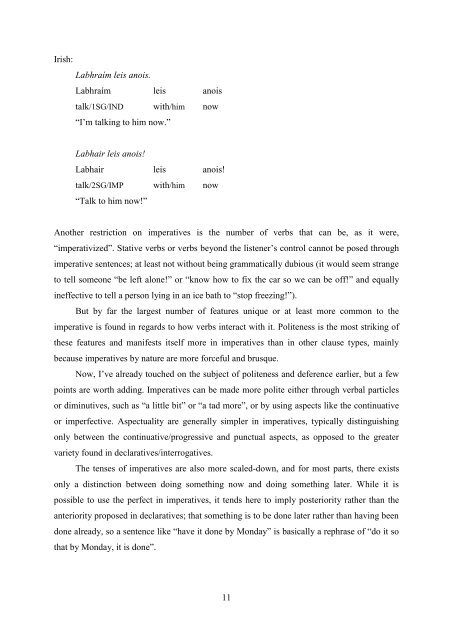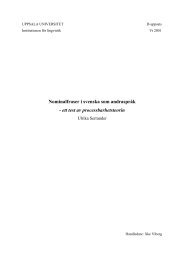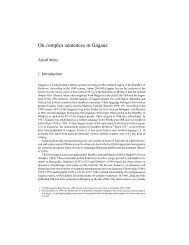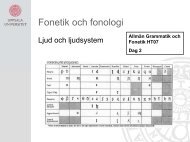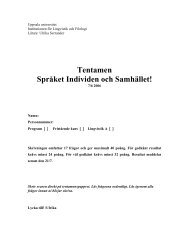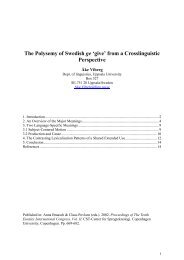The function of non-canonical imperatives in the languages of Europe
The function of non-canonical imperatives in the languages of Europe
The function of non-canonical imperatives in the languages of Europe
Create successful ePaper yourself
Turn your PDF publications into a flip-book with our unique Google optimized e-Paper software.
Irish:<br />
Labhraím leis anois.<br />
Labhraím leis anois<br />
talk/1SG/IND with/him now<br />
“I’m talk<strong>in</strong>g to him now.”<br />
Labhair leis anois!<br />
Labhair leis anois!<br />
talk/2SG/IMP with/him now<br />
“Talk to him now!”<br />
Ano<strong>the</strong>r restriction on <strong>imperatives</strong> is <strong>the</strong> number <strong>of</strong> verbs that can be, as it were,<br />
“imperativized”. Stative verbs or verbs beyond <strong>the</strong> listener’s control cannot be posed through<br />
imperative sentences; at least not without be<strong>in</strong>g grammatically dubious (it would seem strange<br />
to tell someone “be left alone!” or “know how to fix <strong>the</strong> car so we can be <strong>of</strong>f!” and equally<br />
<strong>in</strong>effective to tell a person ly<strong>in</strong>g <strong>in</strong> an ice bath to “stop freez<strong>in</strong>g!”).<br />
But by far <strong>the</strong> largest number <strong>of</strong> features unique or at least more common to <strong>the</strong><br />
imperative is found <strong>in</strong> regards to how verbs <strong>in</strong>teract with it. Politeness is <strong>the</strong> most strik<strong>in</strong>g <strong>of</strong><br />
<strong>the</strong>se features and manifests itself more <strong>in</strong> <strong>imperatives</strong> than <strong>in</strong> o<strong>the</strong>r clause types, ma<strong>in</strong>ly<br />
because <strong>imperatives</strong> by nature are more forceful and brusque.<br />
Now, I’ve already touched on <strong>the</strong> subject <strong>of</strong> politeness and deference earlier, but a few<br />
po<strong>in</strong>ts are worth add<strong>in</strong>g. Imperatives can be made more polite ei<strong>the</strong>r through verbal particles<br />
or dim<strong>in</strong>utives, such as “a little bit” or “a tad more”, or by us<strong>in</strong>g aspects like <strong>the</strong> cont<strong>in</strong>uative<br />
or imperfective. Aspectuality are generally simpler <strong>in</strong> <strong>imperatives</strong>, typically dist<strong>in</strong>guish<strong>in</strong>g<br />
only between <strong>the</strong> cont<strong>in</strong>uative/progressive and punctual aspects, as opposed to <strong>the</strong> greater<br />
variety found <strong>in</strong> declaratives/<strong>in</strong>terrogatives.<br />
<strong>The</strong> tenses <strong>of</strong> <strong>imperatives</strong> are also more scaled-down, and for most parts, <strong>the</strong>re exists<br />
only a dist<strong>in</strong>ction between do<strong>in</strong>g someth<strong>in</strong>g now and do<strong>in</strong>g someth<strong>in</strong>g later. While it is<br />
possible to use <strong>the</strong> perfect <strong>in</strong> <strong>imperatives</strong>, it tends here to imply posteriority ra<strong>the</strong>r than <strong>the</strong><br />
anteriority proposed <strong>in</strong> declaratives; that someth<strong>in</strong>g is to be done later ra<strong>the</strong>r than hav<strong>in</strong>g been<br />
done already, so a sentence like “have it done by Monday” is basically a rephrase <strong>of</strong> “do it so<br />
that by Monday, it is done”.<br />
11


